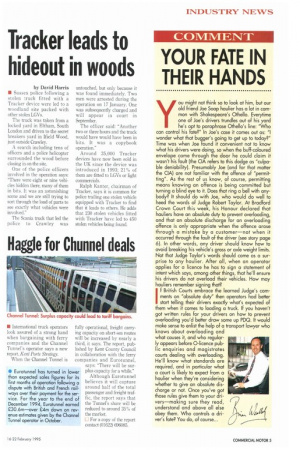YOUR FATE IN THEIR HANDS
Page 7

If you've noticed an error in this article please click here to report it so we can fix it.
you might not think so to look at him, but our old friend Joe Soap haulier has a lot in common with Shakespeare's Othello. Everytime one of Joe's drivers trundles out of his yard he's apt to paraphrase Othello's line: "Who can control his fate?" In Joe's case it comes out as: "I wonder what that bugger's going to get up to today?" Time was when Joe found it convenient not to know what his drivers were doing, so when the buff-coloured envelope came through the door he could claim it wasn't his fault (the CIA refers to this dodge as "culpable deniability). Presumably Joe (and for that matter the CIA) are not familiar with the offence of "permitting". As the rest of us know, of course, permitting means knowing an offence is being committed but turning a blind eye to it. Does that ring a bell with anybody? It should do with Joe, who would do well to heed the words of Judge Robert Taylor. At Bradford Crown Court this week, his Honour declared that hauliers have an absolute duty to prevent overloading, and that an absolute discharge for an overloading offence is only appropriate when the offence arose through a mistake by a customer—not when it occurred through the fault of the driver (see story page 6). In other words, any driver should know how to avoid breaking his vehicle's gross or axle weight limits. Not that Judge Taylor's words should come as a surprise to any haulier. After all, when an operator applies for a licence he has to sign a statement of intent which says, among other things, that he'll ensure his drivers do not overload their vehicles. How may hauliers remember signing that?
































































































